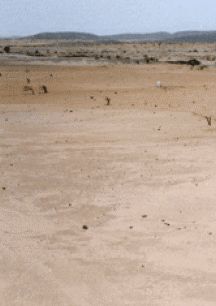Environment Poverty,
a tough place to live in.
To sustain life well the environment needs to be suitable chiefly in terms of its water, salt, warmth, weather, radiation, chemical and biological balance. Any of these being unsuitable, because of nature or because of human activities, can make a region a poor area for living in. A poor environment can itself be said to be a part of general human poverty - but it can also help cause, maintain or worsen general human poverty. Such poor environment or environment poverty can also be called ecological poverty.

Desertification
Nature and Environment.
Nature can be tough. Some parts of the world get too little rain and some get too much rain, giving deserts or swamps. Some parts of the world are too cold and some too hot.
Much of our world is not naturally well suited to producing food or otherwise sustaining human life easily. And that means that humans often need to use drainage for too much water, use irrigation for too little water, and use other methods to try to create and maintain sustainable environments. Sometimes these human environment activities are successful and sustainable, but sometimes they are unsuccessful and may even worsen the environment significantly.
The environment can also have a significant effect on human health, as with malaria which is a bad disease prevalent especially in many warmer countries where it weakens and kills. In principle malaria is relatively simple and cheap to deal with, but growing drug-resistance is a problem as is some governments being unwilling to do much. And using pesticides against mosquitoes is often opposed by green environmental lobbies. Insecticide-treated bed-nets can help in reducing malaria mortality as in Rwanda, but neighbouring war-torn Uganda now has increasing malaria deaths.
Humans and Environment.
The more primitive societies that had long relied directly on their environment, as through farming, had generally learned how to best maintain their natural environment so that a reasonable living could be sustained for thousands of years.
But more modern city-based societies that get their food and other needs from elsewhere have often shown less care about the environment generally, leading to increasing human-activity pollution and climate change and other environment degradation.
Attempts at new large scale farming of a region by people with little knowledge of the area concerned can also seriously backfire and produce desertification or other environment degradation. And large scale mining, industry and other modern human activities have generally worsened the environment in various ways. In many areas of the world today can be found deserted regions often containing ghost-towns which humans have had to abandon due to pollution and other environment degradation causing general poverty.
Pollution and Global Warming.
Today pollution-induced global warming is a major environment and poverty issue, attributed by some to increasing Carbon Dioxide from excessive burning of fossil fuels like coal, oil and gas as for producing electricity. These fossil fuels have a limited supply and may start to run out and increase in price, so governments now are having to consider encouraging alternatives although often rather slowly. While some alternatives like wind power are generally more environment friendly, some alternatives like nuclear power can pose real problems.
The new biofuel industry converting foods to fuel actually gives a little less Carbon Dioxide overall than fossil fuel use, but can of course be very unhelpful for dealing with poverty as it helps increase food prices for many poor. However, for the many poor small-farm families in some poor countries, increased food prices may actually help them somewhat. It has been noted that growing algae or seaweed may be a more useful form of biofuel production. See
Food To Fuel, ODI pdf 135 kb
There is now maybe little chance of stopping global warming from soon ending the human race, because global warming is being boosted by population growth pushed by bureaucratic governments boosting GDP and by some churches pushing population increase and by improving medicine cutting deaths. Increasing populations always create increasing pollution.
Many politicians may say that they will deal with it, but they may have left it too late so that now it has probably gone too far for politicians to be able to stop it with current technology.
This very poor situation is also helped by bureaucratic governments with bureaucratic education and science setups doing poor science funding of repeated expensive atom-smashing experiments that offer little, instead of funding new basic science experiments on stuff like gravity that might give a big breakthrough that could be the only real chance of saving our human race from a likely imminent global warming end ? Some big push of the right kind of science funding rebalancing seems urgently needed and need cost nothing, otherwise we need somehow a worldwide one-child-policy plus stopping medical progress and humanitarian aid that help to boost population ? (see the bottom of
New Science.)